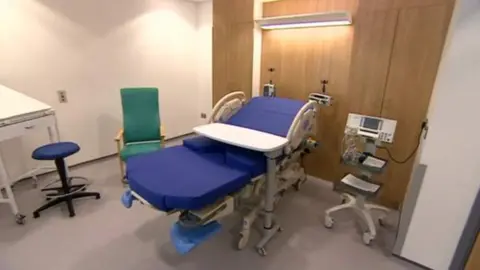Three Shropshire maternity units to close in July
 Getty Images
Getty ImagesThree rural maternity units in Shropshire will close for up to six months from 1 July.
Maternity units in Ludlow, Oswestry and Bridgnorth are being closed due to staffing challenges at Shrewsbury and Telford Hospital Trust (SaTH).
The decision was made as a report was published reviewing stillbirth and infant deaths at the trust, which found they were still "too high".
Expectant mothers will be offered an alternative location for their births.
Staff sickness combined with a drop in the number of midwives prepared to work overtime has led to "significant challenges in our ability to fully staff teams", SaTH said in a statement.

This has meant a number of services have had to be suspended at Midwife-Led Units (MLUs) at short notice.
Simon Wright, chief executive of Shropshire's hospitals said suspending services for a length of time would be better because "then the mums have certainty".
In the meantime, women due to give birth at Ludlow, Oswestry or Bridgnorth be offered appropriate alternatives either at home or hospitals in Shrewsbury, Telford, Hereford or Wrexham.
The announcement of the closures comes on the same day as a review into the trust's maternity services.
It is one of three reports following deaths of babies caused by errors in labour, with another commissioned by Jeremy Hunt.
It stated that while perinatal mortality - stillbirths and deaths in the first week of a child's life - has fallen, it is "still too high and requires additional action".
However, it concludes that "safety in maternity is protected by the efforts of staff".

Analysis by BBC social affairs correspondent Michael Buchanan
This review set out to ask two main questions of the trust - are maternity services safe and did we learn from previous mistakes?
This badly written report uses lots of words to say very little. Neither question is clearly answered.
Talk of a "high degree of energy to provide safe maternity services" doesn't say services are safe.
As to the second question, there is a clear insinuation that major cultural problems within the maternity service has not resulted in learning from avoidable deaths.
Curiously, the person who many blame for the setting that culture, the long-term former head of midwifery, Cathy Smith, has been promoted to lead cultural improvements across the trust.
Many of the recommendations have been made previously - some, years ago - and why they haven't been implemented raises continuing serious questions of the trust.
This quick, six-week review will not take any pressure off the trust as it fails to answer the fundamental questions both bereaved parents and the wider public have raised.

Mr Wright said: "It is important that all women who are currently using our services or who are about to access them, as well as their partners, are reassured about the safety of those services.
"However, we know that we can still continue to improve.
"We have made a determined effort to improve monitoring of babies' heartbeats, including regular training and investment in equipment to promote safer use and better interpretation of results."
